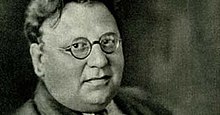Johannes Guter
| Johannes Guter | |
|---|---|
 |
|
| Born |
Janis Guters 25 April 1882 Riga, Russian Empire |
| Died | 18 March 1962 (aged 79) Greifswald, Germany |
| Occupation | Film director, film producer, writer |
| Years active | 1917-1944 |
Johannes Guter (25 April 1882 – 18 March 1962) born Janis Guters was a Latvian filmmaker, screenwriter, and occasional film producer. Although most of his work is now lost, he is considered a pioneer of German silent cinema and expressionism.
Born in Riga during the period when Latvia was part of the Russian Empire, Guter was educated at the Technical University in his home city and made a name for himself as a budding theatrical actor. After the Russian Revolution of 1905, he fled to Berlin in Germany, only to be arrested for the murder of a police officer when he returned to his homeland in 1907. In 1908, after bail was posted, he fled again before his trial, this time settling in Vienna. By 1910 he had directed his first play in Vienna, before moving to Frankfurt where he worked at the New Theatre as a director. In 1917 he was employed at the Hessian State Theatre in Wiesbaden and finally at the Trianon Theatre in Berlin.
At the Trianon Theatre, Guter was first introduced to contacts in the film industry. He directed his first silent movie Die Diamantenstiftung (The Diamond Foundation) in 1917, starring his then girlfriend, and fellow Latvian, Marija Leiko. He followed this in 1918 with two Stuart Webbs detective movies, Die Geisterjagd (The Ghost Hunt) and Ein rätselhafter Blick, both starring Ernst Reicher in the lead.
In 1919 Guter formed his own production company, Centaurfilm, and in 1920 released Die Frau im Käfig (The Woman in the Cage) his only foray as a producer. In 1920 he signed a contract with Erich Pommer, and during the 1920s his films took on a more fantastical slant, but he also directed melodramas and comedies. His most significant release during this period was his 1925 film Der Turm des Schweigens (The Tower of Silence), which became the first of Guter's movies to be restored and was re-premier at the 2007 Berlin Film Festival. The 1920s also saw Guter directing films with some of Germany's most popular actors, including several films with Willy Fritsch: Blitzzug der Liebe (1925), Die Boxerbraut (1926) and Der Tanzstudent (1928). Despite his connection with the German film industry, Guter spent much of the 1920s living in Latvia, where he spent time attempting to build a Latvian film industry.
...
Wikipedia
